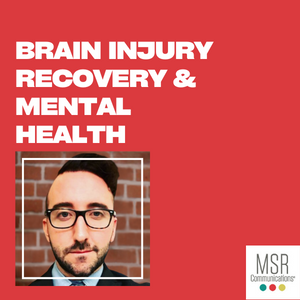Share This
Celebrating Mental Health Month: Spotlight on Trevor Turner
This men’s health month, we take this opportunity to recognize one of our outstanding team members and brain injury survivor, Trevor Turner.
At MSR Communications, Trevor serves as an invaluable Account Executive, bringing a fresh perspective that enriches our work and reminds us of the profound impact we can have. Within the broader community, Trevor is the founder of Brain Talk and host of the Bleeding Brain Podcast, which raises awareness about topics like the flaws in the healthcare system and the need for more mental health services and resources to help people recovering from traumatic brain injuries. He’s been featured in Healthcare Degree, discussing what people need to know about occupational therapy and mental health. His unwavering commitment to raising awareness about crucial issues has become integral to his professional and personal journey.
Trevor’s Story
At the age of 14, Trevor’s life took an unexpected turn when he suddenly experienced an AVM brain bleed. This traumatic event left him unconscious for a six-month period. When he regained consciousness, he underwent intensive in-house physical rehabilitation, which included physical therapy (PT), occupational therapy (OT), and speech therapy. He made an impressive recovery over the course of a summer and was ready to go back to school in the fall, but then he faced another bleed due to a complication from the first.
Determined to find a solution, his parents sought help from numerous doctors, but they kept getting bad news and were starting to prepare for the worst. Finally, they found a neurosurgeon willing to perform the high-risk surgery he needed.
The Mental Toll
According to Trevor, when someone experiences a traumatic brain injury, they become a new person and struggle to come to terms with who they are. It’s not just about relearning how to perform basic life skills but saying goodbye to who they were while placing their current life on hold. It can be an emotional journey without a clear end in sight.
Advocating for Brain Injury Survivors
Occupational Therapists (OTs) play a key role as members of multidisciplinary medical teams, working closely with individuals to help them regain essential life skills that contribute to their overall mental health. However, Trevor raises an important concern, highlighting that sometimes PT or OT can be viewed as only a job. In Trevor’s case, he was a teenager who didn’t know what OT was or why he needed it when he couldn’t feel the left side of his body. He wished his OT had spent more time with him teaching him the practical skills that would benefit a teenager, such as tying his shoes or spreading butter on toast rather than moving blocks from one end of a table to another.
Trevor’s story serves as a reminder of the importance of the mental health aspects of care, especially within the rehabilitation process. He is now on a mission to change the rehabilitation process for brain injury survivors. To learn more, visit www.braintalkmedia.com.



